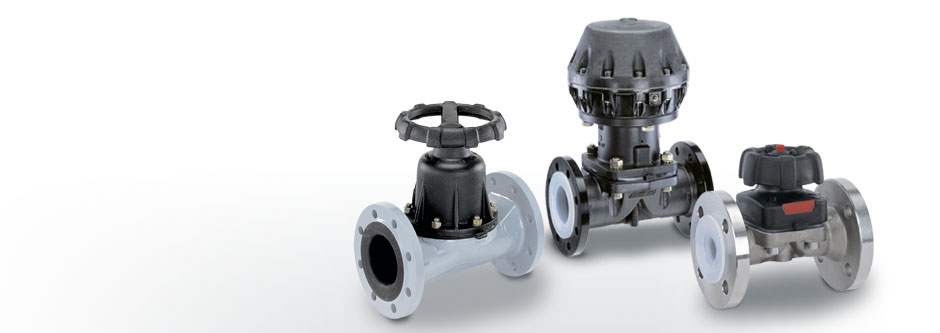Lined diaphragm valves

In no other sector are the requirements as diverse as in industrial applications. Whether in the field of water treatment, the chemical industry, the paper industry or the mining industry, to name just a few, GEMÜ diaphragm valves with various different linings are the first process valve of choice. In many cases, a valve with a full metal body cannot be used, since the corrosive medium attacks and can even destroy the material.
A purely plastic body is often also unsuitable, since the temperatures can be higher than the material allows. GEMÜ has the right solution with its lined metal valve bodies, which meet even the strictest requirements in conjunction with the appropriate diaphragm material and thereby ensure a high degree of operational reliability.
Full bore diaphragm valves as opposed to weir-type diaphragm valves have specific advantages in certain media applications.
Full bore diaphragm valves
Full bore diaphragm valves are primarily used in the fields of water and waste water treatment, mining, the mineral, paper and cellulose processing industry, the chemical industry or at power stations and steelworks. Their virtually full bore gives them an advantage over other conventional shut-off valves, particularly when working with viscous liquids such as slurry and liquids with a high solid or fibre content. A metal valve body with hard rubber lining can be used when processing abrasive media such as surface water with sand content or milk of lime for water treatment. The entire medium wetted part is therefore protected by the lining, which prevents micro-pitting (hydroabrasion)
A new product that rounds off our portfolio of full bore diaphragm valves is the GEMÜ 657. This is also a manually operated valve that has been designed with specific emphasis on achieving the highest Kv values. The high-flow valve, which is available in nominal widths from DN 25 to DN 200, has been designed in such a way that the full pipe diameter is available when the valve is open. In various applications, this allows smaller nominal sizes to be used than would be the case with conventional valves, which in turn helps reduce costs.
Weir-type diaphragm valves
Weir-type diaphragm valves are used far more frequently as shut-off valves than full bore diaphragm valves. Indeed, they can be used in around 90% of all industrial applications. Depending on the application in question, valves with purely metal bodies made of cast iron or stainless steel sometimes do not offer the necessary protection. Indeed, they can quickly reach their limits, particularly when processing corrosive media. For these cases, metal bodies made of GGG40.3 spheroidal iron or even 1.4408 investment casting stainless steel are lined with PFA (perfluoroalkoxy) using the latest plastic injection moulding machines. The advantages of this process, coupled with our many years of expertise, produce high quality, precisely definable geometric features, a consistent wall thickness, as well as a high degree of process system safety and reproducibility of the linings. Other high quality materials such as PP (polypropylene) and hard rubber are also incorporated in the metal bodies using the same process. Some typical applications are sulphuric acid, chlorine and caustic soda.
Actuator Manual
GEMÜ 653
GEMÜ 654
GEMÜ 671
GEMÜ 673
GEMÜ 673P9
GEMÜ 675
Actuator Pneumatic
GEMÜ 620
GEMÜ 687
GEMÜ 695
Actuator Motorised
GEMÜ 648
GEMÜ 698
A purely plastic body is often also unsuitable, since the temperatures can be higher than the material allows. GEMÜ has the right solution with its lined metal valve bodies, which meet even the strictest requirements in conjunction with the appropriate diaphragm material and thereby ensure a high degree of operational reliability.
Full bore diaphragm valves as opposed to weir-type diaphragm valves have specific advantages in certain media applications.
Full bore diaphragm valves
Full bore diaphragm valves are primarily used in the fields of water and waste water treatment, mining, the mineral, paper and cellulose processing industry, the chemical industry or at power stations and steelworks. Their virtually full bore gives them an advantage over other conventional shut-off valves, particularly when working with viscous liquids such as slurry and liquids with a high solid or fibre content. A metal valve body with hard rubber lining can be used when processing abrasive media such as surface water with sand content or milk of lime for water treatment. The entire medium wetted part is therefore protected by the lining, which prevents micro-pitting (hydroabrasion)
A new product that rounds off our portfolio of full bore diaphragm valves is the GEMÜ 657. This is also a manually operated valve that has been designed with specific emphasis on achieving the highest Kv values. The high-flow valve, which is available in nominal widths from DN 25 to DN 200, has been designed in such a way that the full pipe diameter is available when the valve is open. In various applications, this allows smaller nominal sizes to be used than would be the case with conventional valves, which in turn helps reduce costs.
Weir-type diaphragm valves
Weir-type diaphragm valves are used far more frequently as shut-off valves than full bore diaphragm valves. Indeed, they can be used in around 90% of all industrial applications. Depending on the application in question, valves with purely metal bodies made of cast iron or stainless steel sometimes do not offer the necessary protection. Indeed, they can quickly reach their limits, particularly when processing corrosive media. For these cases, metal bodies made of GGG40.3 spheroidal iron or even 1.4408 investment casting stainless steel are lined with PFA (perfluoroalkoxy) using the latest plastic injection moulding machines. The advantages of this process, coupled with our many years of expertise, produce high quality, precisely definable geometric features, a consistent wall thickness, as well as a high degree of process system safety and reproducibility of the linings. Other high quality materials such as PP (polypropylene) and hard rubber are also incorporated in the metal bodies using the same process. Some typical applications are sulphuric acid, chlorine and caustic soda.
Actuator Manual
Actuator Pneumatic
Actuator Motorised
